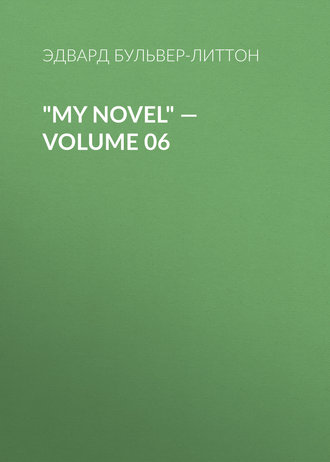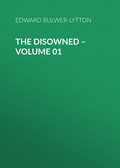
Эдвард Бульвер-Литтон
"My Novel" — Volume 06
CHAPTER XXII
Well, Leonard, this is the first time thou hast shown that thou hast in thee the iron out of which true manhood is forged and shaped. Thou hast the power to resist. Forth, unebriate, unpolluted, he came from the orgy, as yon star above him came from the cloud.
He had a latch-key to his lodgings. He let himself in and walked noiselessly up the creaking wooden stair. It was dawn. He passed on to his window and threw it open. The green elm-tree from the carpenter's yard looked as fresh and fair as if rooted in solitude, leagues away from the smoke of Babylon.
"Nature, Nature!" murmured Leonard, "I hear thy voice now. This stills, this strengthens. But the struggle is very dread. Here, despair of life,—there, faith in life. Nature thinks of neither, and lives serenely on."
By and by a bird slid softly from the heart of the tree, and dropped on the ground below out of sight. But Leonard heard its carol. It awoke its companions; wings began to glance in the air, and the clouds grew red towards the east.
Leonard sighed and left the window. On the table, near Helen's rose- tree, which he bent over wistfully, lay a letter. He had not observed it before. It was in Helen's hand. He took it to the light, and read it by the pure, healthful gleams of morn:—
IVY LODGE
Oh, my dear brother Leonard, will this find you well, and (more happy I dare not say, but) less sad than when we parted? I write kneeling, so that it seems to me as if I wrote and prayed at the same time. You may come and see me to-morrow evening, Leonard. Do come, do,—we shall walk together in this pretty garden; and there is an arbour all covered with jessamine and honeysuckle, from which we can look down on London. I have looked from it so many times,— so many—trying if I can guess the roofs in our poor little street, and fancying that I do see the dear elm-tree.
Miss Starke is very kind to me; and I think after I have seen you, that I shall be happy here,—that is, if you are happy.
Your own grateful sister,
HELEN.
P. S.—Any one will direct you to our house; it lies to the left near the top of the hill, a little way down a lane that is overhung on one side with chestnut-trees and lilacs. I shall be watching for you at the gate.
Leonard's brow softened, he looked again like his former self. Up from the dark sea at his heart smiled the meek face of a child, and the waves lay still as at the charm of a spirit.
CHAPTER XXIII
"And what is Mr. Burley, and what has he written?" asked Leonard of Mr. Prickett, when he returned to the shop.
Let us reply to that question in our own words, for we know more about Mr. Burley than Mr. Prickett does.
John Burley was the only son of a poor clergyman, in a village near Ealing, who had scraped and saved and pinched, to send his son to an excellent provincial school in a northern county, and thence to college. At the latter, during his first year, young Burley was remarked by the undergraduates for his thick shoes and coarse linen, and remarkable to the authorities for his assiduity and learning. The highest hopes were entertained of him by the tutors and examiners. At the beginning of the second year his high animal spirits, before kept down by study, broke out. Reading had become easy to him. He knocked off his tasks with a facile stroke, as it were. He gave up his leisure hours to Symposia by no means Socratical. He fell into an idle, hard-drinking set. He got into all kinds of scrapes. The authorities were at first kind and forbearing in their admonitions, for they respected his abilities, and still hoped he might become an honour to the University. But at last he went drunk into a formal examination, and sent in papers, after the manner of Aristophanes, containing capital jokes upon the Dons and Big- wigs themselves. The offence was the greater and seemed the more premeditated for being clothed in Greek. John Burley was expelled. He went home to his father's a miserable man, for, with all his follies, he had a good heart. Removed from ill example, his life for a year was blameless. He got admitted as usher into the school in which he had received instruction as a pupil. This school was in a large town. John Burley became member of a club formed among the tradesmen, and spent three evenings a week there. His astonishing convivial and conversational powers began to declare themselves. He grew the oracle of the club; and, from being the most sober, peaceful assembly in which grave fathers of a family ever smoked a pipe or sipped a glass, it grew under Mr. Burley's auspices the parent of revels as frolicking and frantic as those out of which the old Greek Goat Song ever tipsily rose. This would not do. There was a great riot in the streets one night, and the next morning the usher was dismissed. Fortunately for John Burley's conscience, his father had died before this happened,—died believing in the reform of his son. During his ushership Mr. Burley had scraped acquaintance with the editor of the county newspaper, and given him some capital political articles; for Burley was, like Parr and Porson, a notable politician. The editor furnished him with letters to the journalists in London, and John came to the metropolis and got employed on a very respectable newspaper. At college he had known Audley Egerton, though but slightly: that gentleman was then just rising into repute in parliament. Burley sympathized with some question on which Audley had distinguished himself, and wrote a very good article thereon,—an article so good that Egerton inquired into the authorship, found out Burley, and resolved in his own mind to provide for him whenever he himself came into office. But Burley was a man whom it was impossible to provide for. He soon lost his connection with the news paper. First, he was so irregular that he could never be depended upon. Secondly, he had strange, honest, eccentric twists of thinking, that could coalesce with the thoughts of no party in the long run. An article of his, inadvertently admitted, had horrified all the proprietors, staff, and readers of the paper. It was diametrically opposite to the principles the paper advocated, and compared its pet politician to Catiline. Then John Burley shut himself up and wrote books. He wrote two or three books, very clever, but not at all to the popular taste,—abstract and learned, full of whims that were caviare to the multitude, and larded with Greek. Nevertheless they obtained for him a little money, and among literary men some reputation. Now Audley Egerton came into power, and got him, though with great difficulty,—for there were many prejudices against this scampish, harum-scarum son of the Muses,—a place in a public office. He kept it about a month, and then voluntarily resigned it. "My crust of bread and liberty!" quoth John Burley, and he vanished into a garret. From that time to the present he lived—Heaven knows how! Literature is a business, like everything else; John Burley grew more and more incapable of business. "He could not do task-work," he said; he wrote when the whim seized him, or when the last penny was in his pouch, or when he was actually in the spunging-house or the Fleet,—migrations which occurred to him, on an average, twice a year. He could generally sell what he had actually written, but no one would engage him beforehand. Editors of magazines and other periodicals were very glad to have his articles, on the condition that they were anonymous; and his style was not necessarily detected, for he could vary it with the facility of a practised pen. Audley Egerton continued his best supporter, for there were certain questions on which no one wrote with such force as John Burley,— questions connected with the metaphysics of politics, such as law reform and economical science. And Audley Egerton was the only man John Burley put himself out of the way to serve, and for whom he would give up a drinking bout and do task-work; for John Burley was grateful by nature, and he felt that Egerton had really tried to befriend him. Indeed, it was true, as he had stated to Leonard by the Brent, that even after he had resigned his desk in the London office, he had had the offer of an appointment in Jamaica, and a place in India, from the minister. But probably there were other charms then than those exercised by the one- eyed perch that kept him to the neighbourhood of London. With all his grave faults of character and conduct, John Burley was not without the fine qualities of a large nature. He was most resolutely his own enemy, it is true, but he could hardly be said to be any one else's. Even when he criticised some more fortunate writer, he was good-humoured in his very satire: he had no bile, no envy. And as for freedom from malignant personalities, he might have been a model to all critics. I must except politics, however, for in these he could be rabid and savage. He had a passion for independence, which, though pushed to excess, was not without grandeur. No lick-platter, no parasite, no toad-eater, no literary beggar, no hunter after patronage and subscriptions; even in his dealings with Audley Egerton, he insisted on naming the price for his labours. He took a price, because, as the papers required by Audley demanded much reading and detail, which was not at all to his taste, he considered himself entitled fairly to something more than the editor of the journal wherein the papers appeared was in the habit of giving. But he assessed this extra price himself, and as he would have done to a bookseller. And when in debt and in prison, though he knew a line to Egerton would have extricated him, he never wrote that line. He would depend alone on his pen,—dipped it hastily in the ink, and scrawled himself free. The most debased point about him was certainly the incorrigible vice of drinking, and with it the usual concomitant of that vice,—the love of low company. To be King of the Bohemians, to dazzle by his wild humour, and sometimes to exalt by his fanciful eloquence, the rude, gross natures that gathered round him,—this was a royalty that repaid him for all sacrifice of solid dignity; a foolscap crown that he would not have changed for an emperor's diadem. Indeed, to appreciate rightly the talents of John Burley, it was necessary to hear him talk on such occasions. As a writer, after all, he was now only capable of unequal desultory efforts; but as a talker, in his own wild way, he was original and matchless. And the gift of talk is one of the most dangerous gifts a man can possess for his own sake,—the applause is so immediate, and gained with so little labour. Lower and lower and lower had sunk John Burley, not only in the opinion of all who knew his name, but in the habitual exercise of his talents. And this seemed wilfully—from choice. He would write for some unstamped journal of the populace, out of the pale of the law, for pence, when he could have got pounds from journals of high repute. He was very fond of scribbling off penny ballads, and then standing in the street to hear them sung. He actually once made himself the poet of an advertising tailor, and enjoyed it excessively. But that did not last long, for John Burley was a Pittite,—not a Tory, he used to say, but a Pittite. And if you had heard him talk of Pitt, you would never have known what to make of that great statesman. He treated him as the German commentators do Shakspeare, and invested him with all imaginary meanings and objects, that would have turned the grand practical man into a sibyl. Well, he was a Pittite; the tailor a fanatic for Thelwall and Cobbett. Mr. Burley wrote a poem wherein Britannia appeared to the tailor, complimented him highly on the art he exhibited in adorning the persons of her sons; and bestowing upon him a gigantic mantle, said that he, and he alone, might be enabled to fit it to the shoulders of living men. The rest of the poem was occupied in Mr. Snip's unavailing attempts to adjust this mantle to the eminent politicians of the day, when, just as he had sunk down in despair, Britannia reappeared to him, and consoled him with the information that he had done all mortal man could do, and that she had only desired to convince pigmies that no human art could adjust to THEIR proportions the mantle of William Pitt. /Sic itur ad astra/,—she went back to the stars, mantle and all! Mr. Snip was exceedingly indignant at this allegorical effusion, and with wrathful shears cut the tie between himself and his poet.
Thus, then, the reader has, we trust, a pretty good idea of John Burley, —a specimen of his genus not very common in any age, and now happily almost extinct, since authors of all degrees share in the general improvement in order, economy, and sober decorum, which has obtained in the national manners. Mr. Prickett, though entering into less historical detail than we have done, conveyed to Leonard a tolerably accurate notion of the man, representing him as a person of great powers and learning, who had thoroughly thrown himself away.
Leonard did not, however, see how much Mr. Burley himself was to be blamed for his waste of life; he could not conceive a man of genius voluntarily seating himself at the lowest step in the social ladder. He rather supposed he had been thrust down there by Necessity.
And when Mr. Prickett, concluding, said, "Well, I should think Burley would cure you of the desire to be an author even more than Chatterton," the young man answered gloomily, "Perhaps," and turned to the book-shelves.
With Mr. Prickett's consent, Leonard was released earlier than usual from his task, and a little before sunset he took his way to Highgate. He was fortunately directed to take the new road by the Regent's Park, and so on through a very green and smiling country. The walk, the freshness of the air, the songs of the birds, and, above all, when he had got half-way, the solitude of the road, served to rouse him from his stern and sombre meditations. And when he came into the lane overhung with chestnut- trees, and suddenly caught sight of Helen's watchful and then brightening face, as she stood by the wicket, and under the shadow of cool, murmurous boughs, the blood rushed gayly through his veins, and his heart beat loud and gratefully.
CHAPTER XXIV
She drew him into the garden with such true childlike joy. Now behold them seated in the arbour,—a perfect bower of sweets and blossoms; the wilderness of roof-tops and spires stretching below, broad and far; London seen dim and silent, as in a dream.
She took his hat from his brows gently, and looked him in the face with tearful penetrating eyes.
She did not say, "You are changed." She said, "Why, why did I leave you?" and then turned away.
"Never mind me, Helen. I am man, and rudely born; speak of yourself. This lady is kind to you, then?"
"Does she not let me see you? Oh, very kind,—and look here."
Helen pointed to fruits and cakes set out on the table. "A feast, brother."
And she began to press her hospitality with pretty winning ways, more playful than was usual to her, and talking very fast, and with forced, but silvery, laughter.
By degrees she stole him from his gloom and reserve; and though he could not reveal to her the cause of his bitterest sorrow, he owned that he had suffered much. He would not have owned that to another living being. And then, quickly turning from this brief confession, with assurances that the worst was over, he sought to amuse her by speaking of his new acquaintance with the perch-fisher. But when he spoke of this man with a kind of reluctant admiration, mixed with compassionate yet gloomy interest, and drew a grotesque, though subdued, sketch of the wild scene in which he had been spectator, Helen grew alarmed and grave.
"Oh, brother, do not go there again,—do not see more of this bad man."
"Bad!—no! Hopeless and unhappy, he has stooped to stimulants and oblivion—but you cannot understand these things, my pretty preacher."
"Yes, I do, Leonard. What is the difference between being good and bad?
The good do not yield to temptations, and the bad do."
The definition was so simple and so wise that Leonard was more struck with it than he might have been by the most elaborate sermon by Parson Dale.
"I have often murmured to myself since I lost you, 'Helen was my good angel; '—say on. For my heart is dark to myself, and while you speak light seems to dawn on it."
This praise so confused Helen that she was long before she could obey the command annexed to it. But, by little and little, words came to both more frankly. And then he told her the sad tale of Chatterton, and waited, anxious to hear her comments.
"Well," he said, seeing that she remained silent, "how can I hope, when this mighty genius laboured and despaired? What did he want, save birth and fortune and friends and human justice?"
"Did he pray to God?" asked Helen, drying her tears. Again Leonard was startled. In reading the life of Chatterton he had not much noted the scepticism, assumed or real, of the ill-fated aspirer to earthly immortality. At Helen's question, that scepticism struck him forcibly. "Why do you ask that, Helen?"
"Because, when we pray often, we grow so very, very patient," answered the child. "Perhaps, had he been patient a few months more, all would have been won by him, as it will be by you, brother, for you pray, and you will be patient."
Leonard bowed his head in deep thought, and this time the thought was not gloomy. Then out from that awful life there glowed another passage, which before he had not heeded duly, but regarded rather as one of the darkest mysteries in the fate of Chatterton.
At the very time the despairing poet had locked himself up in his garret, to dismiss his soul from its earthly ordeal, his genius had just found its way into the light of renown. Good and learned and powerful men were preparing to serve and save him. Another year—nay, perchance another month—and he might have stood acknowledged sublime in the foremost ranks of his age.
"Oh, Helen!" cried Leonard, raising his brows, from which the cloud had passed, "why, indeed, did you leave me?"
Helen started in her turn as he repeated this regret, and in her turn grew thoughtful. At length she asked him if he had written for the box which had belonged to her father and been left at the inn.
And Leonard, though a little chafed at what he thought a childish interruption to themes of graver interest, owned, with self-reproach, that he had forgotten to do so. Should he not write now to order the box to be sent to her at Miss Starke's?
"No; let it be sent to you. Take care of it. I should like to know that something of mine is with you; and perhaps I may not stay here long."
"Not stay here? That you must, my dear Helen,—at least as long as Miss Starke will keep you, and is kind. By and by" (added Leonard, with something of his former sanguine tone) "I may yet make my way, and we shall have our cottage to ourselves. But—oh, Helen!—I forgot—you wounded me; you left your money with me. I only found it in my drawers the other day. Fie! I have brought it back."
"It was not mine,—it is yours. We were to share together,—you paid all; and how can I want it here, too?" But Leonard was obstinate; and as Helen mournfully received back all that of fortune her father had bequeathed to her, a tall female figure stood at the entrance of the arbour, and said, in a voice that scattered all sentiment to the winds, "Young man, it is time to go."







